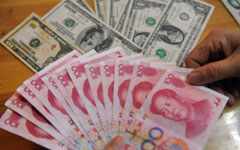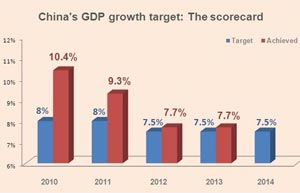In the United States, consumption in housing accounts for 20 percent of total domestic consumption and 14 percent of US GDP. In the US, aside from actual rent paid for housing by tenants, the annual imputed rent of homeowners is counted in personal consumption expenditures.
 |
 |
But in China, most actual rent payments aren't included in the national accounts. And the imputed rent of home - owners, who make up 80 percent of the Chinese population, is calculated at just 2 percent of historic prices, which were extremely low before the real estate bubble developed in 2008.
Cai also thinks China's service sector is seriously underestimated. In developed countries, services comprise more than 70 percent of the national economy. But the figure is only 45 percent in China. This contrast is often used to highlight the imbalance of China's economic structure.
But again, it's different in China. For example, many important types of consumption, such as the medical care provided in public hospitals, are government-controlled, and prices are kept low.
"China's consumption is equivalent to 55 percent of GDP, if these omitted factors are included," said Cai. "And investment is seriously overestimated."
When all provincial-level GDP figures are added up, the sum customarily exceeds the national total, because many local governments inflate their figures, and some investments, accounting for nearly 60 percent of China's GDP, are being counted more than once. "Depreciation of investment and the price deflator in China are both understated," Cai noted.
Depreciation measures the decline in the value of tangible assets, while a price deflator takes account of inflation.
"Investment's real share in China's GDP should be about 10 percentage points lower than the current 47 percent."
 Urbanization should be for people's sake |
 |
